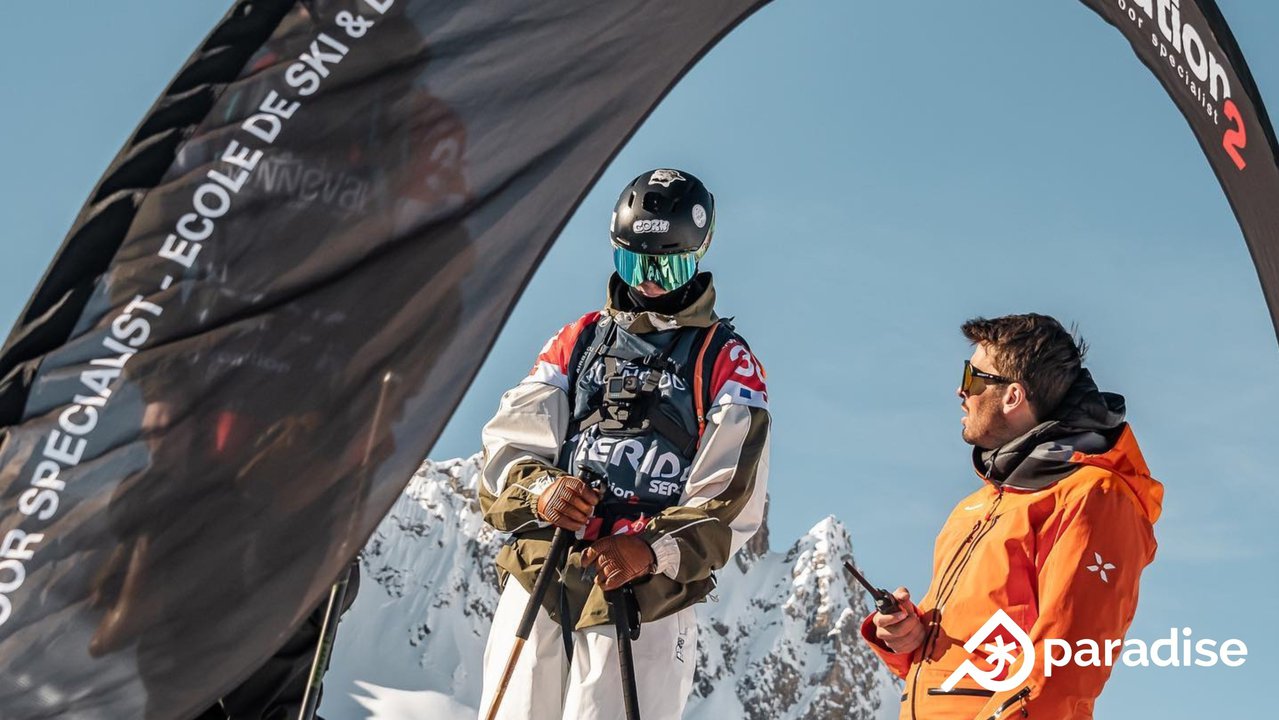LIFE IN THE FREERIDE JUNIOR WORLD TOUR
WRITTEN BY SAM BUGGY
Origonally posted on paradiseskis.com
My name is Sam. I’m a 17 year old athlete on the Freeride Junior World Tour. A typical competition weekend for me starts on a Friday night and ends either on Saturday or Sunday, here's what goes on during the weekend.
On Friday, school ends at 3:50 PM, I go back to my dorm to grab my gear and Vice 105’s. Then my coach picks me and two to three of my teammates up and we drive to the competition mountain. Here we have the accreditation (basically a sign-in) and the riders’ meeting where the organizers discuss the competition. After we are signed in and given our ski passes, we’ll move on to the riders’ meeting where we hear about the snow conditions, closed features/warnings, and other logistics. We don’t usually know where exactly the competition is until this meeting.

(Verbier 2* riders’ meeting)
After the riders' meeting, we drive back to our Air Bnb and head straight to bed. We need to be well-rested for the demanding day ahead of us. A typical morning starts at 6:00 AM or earlier.
At about 6:00 AM on Saturday, we wake up, eat breakfast, and drive to the mountain. It will usually be later in the day when we get our next meal. So, we must eat a good breakfast. The team's favourite is scrambled eggs with mushrooms, kale, and tomatoes. Most of the time the mountain opens early for the competitors to travel to the competition face.

(On our way to the competition face Verbier 2*)
Once we get to the competition face around 7:00 - 8:00 am, we go to the finish line to complete a visual face inspection. With Freeride Junior Tour events there are no practice runs. All lines done in a competition must be scouted beforehand during the face inspection and done for the first time during your run. Competitors memorize their lines while looking up at the face for any landmarks that will help during the run. Usually, we use binoculars to view all the features of our run and then draw them onto our phones for reference. We decide exactly which cliffs we are going to jump off beforehand and we select what trick we are going to do off of it (if you are going to do one).

(Left is the face of La Mouche from our Verbier 2*)

(Face check with our team coach)
The blue line in the top photo was my line for the competition and anything in red is closed for athletes. After around an hour of face inspection, the competition will start. During the face check, I typically commit landmarks to memory so that when I leave the start gate I know exactly where I am. In this particular event, I used clusters of trees and some cliffs to make sure I knew where I was.
After the face check, we take the chair lift back up to the top of the mountain for the safety check. The FWT team scans our Recco reflector, checks that our avalanche beacon is working, feels for our back protector, and ensures we're carrying a shovel and probe.
After this, you hike, ski, or traverse over to the competition face and wait to get in the start gate.

(Waiting at the start gate)

(Looking down from the start gate for Verbier 2* - Paradise VICE 105 skis)
At the start gate area, there are usually around 10 riders in front of you. Typically you want to take this time to calm down, maybe stretch and listen to some music. With about five riders until my bib number, I put my skis on and started my GoPro. I make sure that my helmet and avalanche backpack are completely strapped on. Then I find the perfect song for my run and pause it. Once I get up to the start gate, the staff will get a radio from the judges that they are ready for the next rider to drop. The staff says something like, “3, 2, 1 drop in” and then you go. When they say ‘drop in’ I start my music and kick off from the start gate.
During the run I look for landmarks that mark where I am on the face so that I can find my planned line for the tricks and cliffs. A run typically lasts about a minute to two minutes.

(My Verbier 2 run)
After a long competition day, the award ceremony is usually held around 4:30 PM. After the prizes/awards, we head back to our hotel or Airbnb, enjoy dinner, and talk about our runs and if we can improve. During the Verbier 2* event, I back-slapped my three-sixty (almost a crash) which made it worth negative points for the judges. We agreed I need to work on better wind-ups and really focus on spotting my landing so next time I can stomp the landing cleaner. After dinner, anywhere from 7:00 - 9:00 PM, we go to bed, exhausted from the early wake-up and high-energy events!
_________________________________________________________________

ABOUT SAM
Hi! I’m Sam! I grew up skiing on the east coast USA, but now I ski in Switzerland. Leysin and Engelberg are my home mountains. You can catch me freeriding every time I ski. When the lines are long I grab my touring gear and scramble for a new peak.


Comments